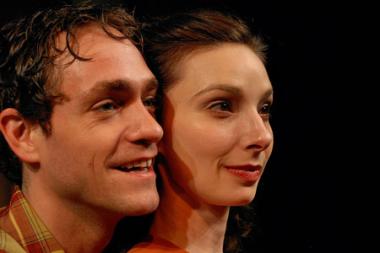“I think there’s something inside us, every one of us, that freezes up when we see anyone different. It’s like a gate that slams down so we can feel safe behind it.”
Two world-premiere plays in the Berkshires this week grasp both sides of that gate, the racial divide that still tortures our country. The Best of Enemies, at Barrington Stage Company, containing the line quoted above, recounts an amazing-but-true episode in the Southern civil rights struggle. Dutch Masters, at the Berkshire Theatre Festival, imagines a true-to-life encounter in New York City. Ironically, perhaps, it’s the fictional work that strikes home more tellingly than the fact-based play.
Mark St. Germain’s two-character study Freud’s Last Session, about a theological debate between the Jewish atheist and the Christian convert C.S. Lewis, was the hit of Barrington Stage’s 2010 season. In Enemies, the playwright focuses on two more real-life figures grappling over mutually hostile convictions.
In the early 1970s, a black organizer from the U.S. Department of Education, charged with forging a path to school desegregation in Durham, N.C., orchestrated an unheard-of alliance between two local community leaders: Ann Atwater, an outspoken African-American activist, and C.P. Ellis, head of the city’s Ku Klux Klan chapter. The play traces their journey from reciprocal loathing through grudging cooperation to respect and even friendship.
Dutch Masters begins in a subway car rattling uptown toward Harlem. A young black man, Eric, strikes up a question-and-hesitant-answer exchange with a young white man, Steve, and cajoles him into sharing a joint and then into his apartment, where a surprising and painful connection between them is revealed. (The title refers not to the Renaissance painters but to the cigarillo in whose wrapper Eric rolls the weed, and obliquely to the Dutch slave masters who settled the city. It also, perhaps intentionally, recalls the lethal subway encounter in LeRoi Jones’ Dutchman.)
What both shows share, besides their themes (and brief, intermissionless running times), are lively, inventive productions and stirring performances. Both employ simple, evocative sets (Enemies includes projections of actual period settings) and both make effective use of ambient sound effects, from the rumble of the D train to the roar of a Klan meeting (Enemies also incorporates a live gospel choir at its climax). Of the six excellent actors in the two plays, the standout is Amari Cheatom, whose volatile but nuanced performance as Eric is bone-chilling and heart-breaking.
I found Greg Keller’s Dutch Masters more compelling than The Best of Enemies largely because it digs more deeply into its theme. Enemies outlines, in broad strokes, a years-long narrative; Masters paints a single illuminating moment in closeup. While both plays present forceful collisions of race in which issues of class play key roles, Masters‘ portrait is excruciatingly textured, while Enemies—not least because it’s too condensed for its topic—too often sounds and feels like a TV movie. Where Masters stabs at the heart of the matter, Enemies settles for heart-warming.
Dutch Masters: Through Aug. 6, Unicorn Theatre, Berkshire Theatre Festival, Stockbridge, (413) 298-5576, berkshiretheatre.org.
The Best of Enemies: Through Aug. 6, Barrington Stage Company, 30 Union St., Pittsfield, (413) 236-8888, barringtonstageco.org.



